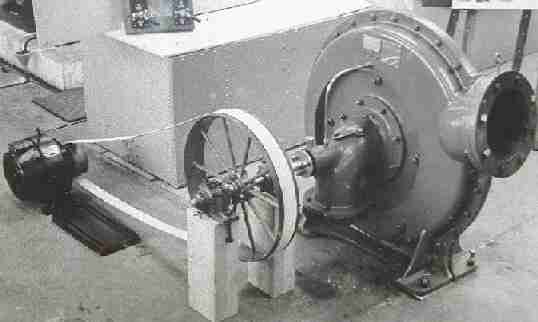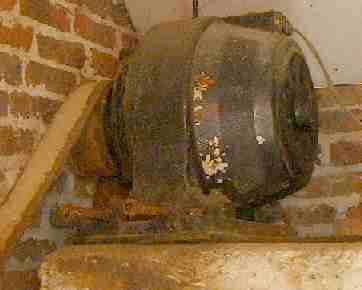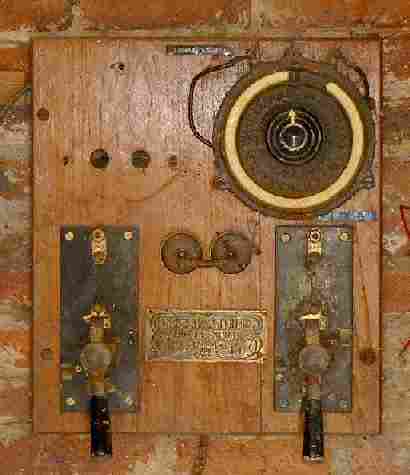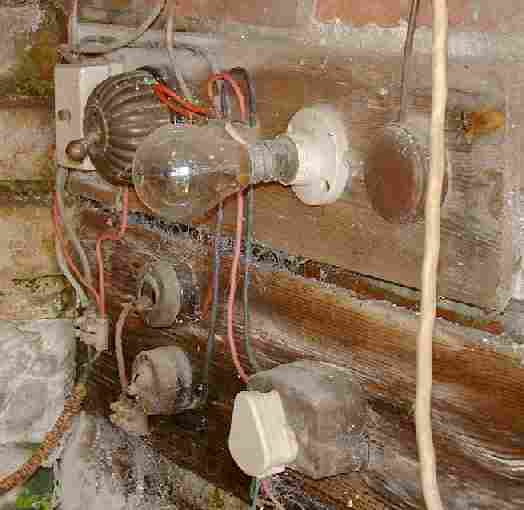|
Having
decided to use the Mill to generate electricity Rudyard
Kipling, he also needed a store building to house 55
lead acid
accumulators, weighing around half a ton, as close
to the house as practicable. The battery store
survives today but as with most other surviving
buildings, there is little evidence of its former use -
it serves as the tea rooms. The battery store in a
larger purpose built installation at Lime Park,
Herstmonceux, was adjoined to the generating
rooms. Remarkably, these two buildings are the only surviving
examples of early electricity generation in
Sussex. The Herstmonceux
building is thought to be the only surviving example of
electricity distribution generation in Europe.

Crompton
dc Generator, belt drive & Gilbert Gilkes Turbine
The
Gilbert Gilkes turbine was recently the subject of a
restoration. It is shown in the picture above
removed, along with the spoked wheel and belt driving
the Crompton direct current generator. The
generator unit is shown in the photograph below in situ.
It is of modest capacity compared to the Edison
Hopkinson generator used at Herstmonceux, and only
capable of producing 15 amps at 110 volts from the four
horsepower turbine. This equates to 1650 watts or
2.21 horspower. Hence, the generator was either
not very efficient, or the turbine was over specified.

Batemans
- Crompton DC Generator
This
building is included on a Monument Protection Programme
commissioned in 1995 by English Heritage, along with The
Old Steam House, generating works at Herstmonceux,
Sussex. There are remarkable parallels between the
Baron de Roemer and Rudyard Kipling. Both had a
fascination for automobiles and electricity. Where
Kipling was content to harness the forces of nature to
provide light to his home, the Baron went further and
generated electricity supplies to a whole village.
However, for Kipling the almost noiseless operation of
the turbine, was paramount to preserving the sanctuary
for creative thought.

Batemans
- Generator isolation switches
The electrical
installation was carried out by Middleton, Electrical
Engineers of Chelmsford and the electrical generator was
supplied by Crompton & Co. of Manchester. Once
again the switchgear and wiring bears strong resemblance
to that used by the Baron de Roemer at Herstmonceux.
It would come as no surprise to the writer to learn that
these two gentlemen knew of the others endeavours, or
even consulted each other. The
turbine and generator system were designed to charge batteries
during the daytime to provide enough current at 110 volts D.C.
to light ten 60 watt bulbs for four hours. In winter the
turbine would run continuously. The battery
capacity was enormous compared to the required
storage. So, either they were extremely
inefficient or a large margin of safety was built in.

Batemans
- Generator room wiring
South-East
Region | East
Sussex | Notable
House Sites | MultiMap
| The
National Trust
Batemans
- Burwash, East Sussex Tel: (01435) 882302 Fax:
(01435) 882811
Opening
times:
23rd March - 29th September. Closed Thursdays and
Fridays except Good Friday. 11.00 am - 5.30 pm last
entry 4.30 pm.
LINKS:
Battle
Abbey
Battle
Museum of Local History
Batemans
Bexhill
Museum
Bexhill
Museum of Costume & Social History
Bodiam
Castle
Buckleys
Yesterdays World
Carr
Taylor Vineyards
Clambers
De
La Warr Pavilion
Farmworld
Great
Dixter
Hastings
Castle
Hastings
Fishermen's Museum
Hastings
Museum & Art Gallery
Herstmonceux
Castle
Kent
& East Sussex Railway
Merriments
Gardens
Old
Town Hall Museum
Pashley
Manor Gardens
Pevensey
Castle
Rye
Art Gallery
Rye
Audio Walks
Rye
Castle Museum
Rye
Story
Underwater
World - Hastings
Sedlescombe
Vineyards
Shipwreck
Heritage Centre
Smugglers
Adventure
White
Rock Theatre
Winchelsea
Court Hall Museum
Herstmonceux
Electricity Generating Works Circa. 1900 -
1936 Links:
Introduction
| Instructions
| ISBN |
Batteries |
Boiler Room
| Floor Plan
|
Industrial Revolution
| Lime
Park | Machinery
| Map
| Power House
Public
Supply | Roof Construction |
Rural Supply |
Sussex Express 1913 |
Conclusion
Archaeology
South East | East
Sussex CC | English
Heritage | SIAS
|